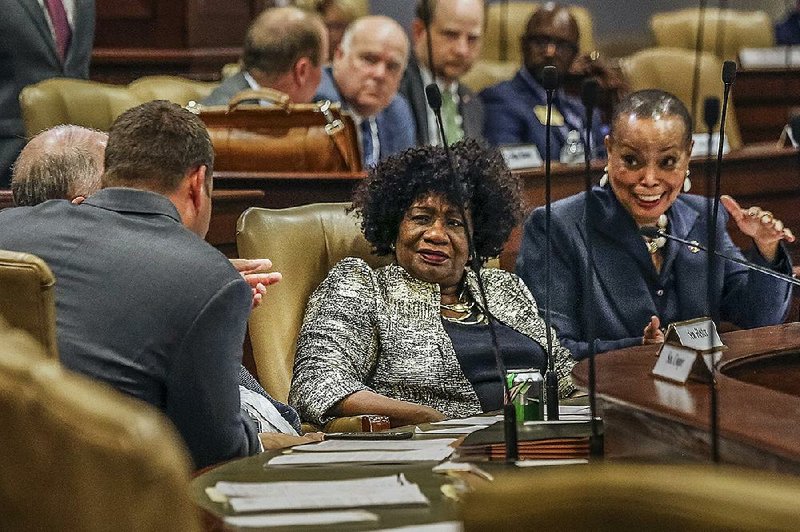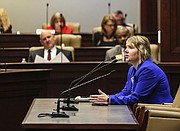In a big push to wrap up the current legislative session by Wednesday, the Joint Budget Committee on Monday advanced identical bills outlining the state's general revenue budget of $5.75 billion for the fiscal year starting July 1.
The House and Senate bills are expected to be approved today by their respective chambers and then receive final approval by the other chamber on Wednesday. Monday was the 85th day of the 92nd General Assembly.
The budget contained in the bills represents a $124.1 million increase over this fiscal year's budget. Most of the increase would be targeted for human services and education programs.
The proposed budget is a 2.2 percent increase over the current fiscal 2019 budget and is "the lowest increase in 10 years," a budget committee co-chairman, Rep. Lane Jean, R-Magnolia, said at a briefing for representatives before the meeting.
The committee also endorsed identical bills that would distribute up to $54.6 million in one-time funds through the state's rainy-day fund for several specific projects, and up to $30 million in one-time discretionary funds for the governor to spend on projects.
[RELATED: Complete Democrat-Gazette coverage of the Arkansas Legislature]
The $54.6 million earmarked for specific projects includes funds for the Quick-Action Closing Fund for economic development incentives for private industry; the University of Arkansas for Medical Sciences' National Cancer Institute Designation Trust Fund; the University of Arkansas Division of Agriculture; and the Succeed Scholarship program.
The state's Revenue Stabilization Act distributes general revenue to various state-supported programs, including the public schools. The primary sources of general revenue are individual income taxes and sales and use taxes.
With no audible dissents, the Joint Budget Committee recommended House and Senate approval of identical versions of the Revenue Stabilization Act for fiscal 2020 that starts July 1. The measures are House Bill 1876 and Senate Bill 597.
Most of the increase in fiscal 2020 would go to the state Department of Human Services, which would get a $68.2 million increase to $1.73 billion, and the Public School Fund, which would get a $30.7 million increase to $2.25 billion.
The proposed Revenue Stabilization Act -- distributed to lawmakers Friday -- would divide the projected general revenue into A, B and C categories, with $5.61 billion going to Category A, $115.6 million to Category B and $14.7 million to Category C.
The state's top spending priorities are placed in Category A, with the other categories of lesser spending priority. Funding to Category B only flows after Category A has been fully funded, and funding to Category C only flows after Category B has been fully funded. The goal of the act is to prevent deficit spending.
Category B includes $61.6 million for the Medicaid program and $30.8 million for general education in the Public School Fund. Category C is $14.7 million for the state's Performance Fund, which was formerly called the Merit Adjustment Fund.
The proposed budget relies on using existing fund balances of $25 million from the state's Performance Fund for performance-based raises, and other raises for certain employees such as those at the Arkansas State Police in the next fiscal year, state officials said.
"The obligations reflected in Category C will be fully funded by the carry-forward fund balance of the Performance Fund. Any revenue received at the FY20 year-end in Category C will simply be used to replenish that fund," finance department spokesman Scott Hardin said after Monday's meeting.
The budget for the Human Services Department includes a $61.6 million increase, to $1.31 billion, in the grants category for the Medicaid program.
It also includes $2.5 million for crisis stabilization units that are designated as a temporary place to send people with mental health emergencies.
The Medicaid funding increase for the next year "is very low when you consider the incremental increases we've seen in recent years," former state administrator Duncan Baird told representatives during their briefing.
This year, the state is paying 7 percent of the cost of the Medicaid expansion program called Arkansas Works, which provides health insurance coverage to about 235,000 low-income Arkansans. The state's share has been projected at about $135 million and the federal government's share at $1.95 billion.
The state's share will increase to 10 percent next year under existing federal law. The state's share of the cost of the program is projected at $177 million and the federal government's share at $1.91 billion, according to a spokesman for the state Department of Finance and Administration.
The proposed Revenue Stabilization Act proposes a $7.8 million increase to $360.9 million for the Department of Correction; a $5.5 million rise to the Department of Community Correction to $93.4 million; and a $5.2 million increase to $71.6 million for the Arkansas State Police.
This includes funding for 30 new parole officers at the Department of Community Correction, the Franklin County and Osceola drug courts, and 14 new positions at the Department of Correction, Baird said.
The state police's budget would allow the agency to have a 50-person troop school each year, which will lead to a net increase of about 12 troopers each in the next two fiscal years, Baird said.
Public two- and four-year colleges would get a $4.1 million increase to $749.7 million as a result of higher education's productivity funding formula and other increases for higher education entities.
The University of Arkansas at Fayetteville's general revenue budget would drop from the current $122.4 million to $122 million and Arkansas State University at Jonesboro's budget would be trimmed from $59 million to $58.8 million under the proposal.
Meanwhile, UAMS' general revenue budget would increase from the current $86.4 million to $88 million and the UA Division of Agriculture's general revenue budget would increase from the current $62.8 million to $63.9 million in the next fiscal year.
The proposed budget also sets aside $15.8 million in rainy-day funds.
The committee also endorsed identical versions of bills that would distribute surplus state funds through the state's rainy-day fund. The bills are House Bill 1865 and Senate Bill 595.
The action came after an attempt by Sen. Will Bond, R-Little Rock, to change the bills to distribute $2.5 million through the rainy-day fund for senior citizens centers. His effort fell two votes short of approval of the 29 votes needed in the Joint Budget Committee.
The proposed budget maintains the $5 million allocation for senior citizens centers in the Department of Human Services.
"In addition, there was special language that was passed during the session that will allow the first $500,000 ... general revenue reclaimed from the divisions of DHS to go to the senior centers," said Baird.
Under HB1865 and SB595, the state treasurer is required to set aside the first $54.6 million of the funds transferred and credited to the rainy-day fund for the following debt obligations and projects:
• Up to $30 million to the Quick Action Closing Fund for incentives to attract new business and economic development.
• Up to $10.5 million to the Department of Correction for lease payments linked to debt service on a 948-bed prison at Malvern, a 400-bed addition at the Grimes Unit at Newport, and a 862-bed Special Needs Unit and addition to Ouachita River Unit at Malvern.
• Up to $10 million to the UAMS National Cancer Institute Designation Trust Fund.
"We are uncertain about what the revenue will be from the other bill that raises revenue for UAMS, so that $10 million is dedicated in advance to ensure that the money is there in [fiscal] 2020 to cover that need," Baird said.
• Up to $1.86 million for the UA Division of Agriculture.
• Up to $1.8 million to the state Department of Education for the Succeed Scholarship program.
• Up to $500,000 to the state Military Department for the Young Challenge program.
HB1865 and SB595 would provide up to $30 million in rainy-day funds to the governor "where he can release funds as needed with certain items requiring [legislative] approval and certain items requiring review," said Kevin Anderson, assistant director of fiscal services for the Bureau of Legislative Research.
A Section on 04/09/2019

